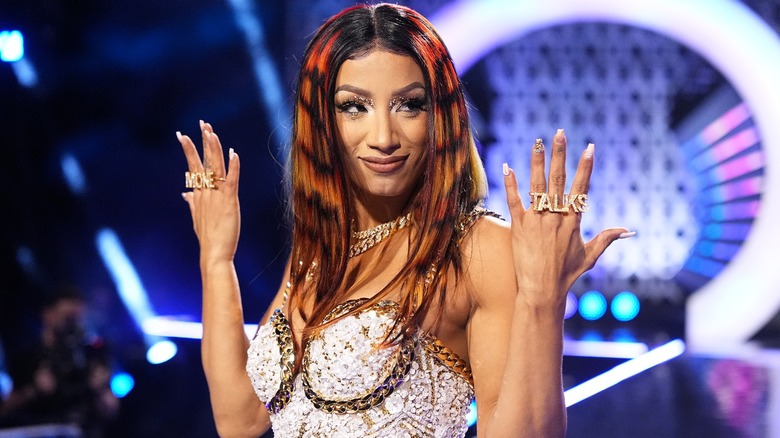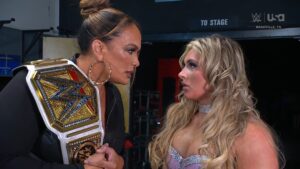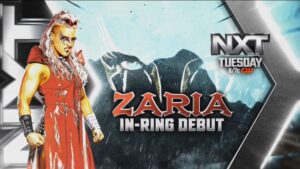In this series, James Staynings takes a deep dive into AEW’s short but impactful history, its present, and its future. In part 1, James discussed how AEW changed the wrestling industry (here).
After exploring AEW’s past in the first two parts, James will examine AEW’s present using Double or Nothing as a case study. In the final part, James will discuss AEW’s future. This will include discussing the problems that AEW faces and questions Tony Khan will have to address.
Spoilt for Choice
“You’ve never had it so good.”
This famous campaign slogan used by political parties in both the UK and US has a double meaning. It’s true that as wrestling fans, we are somewhat in a golden age. We have never had it so good.
The amount of wrestling available; the number of places and opportunities for fans to consume and talk wrestling. The fact that wrestlers have more options and opportunities than ever before means wrestling is in an extremely healthy place.
The other meaning of this phrase links to the Golden Age Fallacy. Like the phrase “enjoy wrestling”, selective memory and bias tends to gloss over underlying cultural issues, inequalities, and legitimate problems that exist within wrestling. There are issues still in WWE, AEW and elsewhere. Regardless, the steps forward are steps that broadly benefit fans and wrestlers alike.
In many ways, this has been AEW’s biggest achievement: choice. Options that were not available or did not exist before now. It’s helped make wrestling better for everyone.
This shouldn’t, but often is, taken for granted. It’s a nice problem to have. As Joni Mitchell once sang: “You don’t know what you got ‘til it’s gone.”
Changes to Pay
Many fans online talk about wrestling as a business rather than simply a passion or pastime. Elsewhere, I’ve demystified (here) the narrative that AEW is WCW in regards to contracts. The main idea is that, with other viable mainstream places for wrestlers to work, that gives the wrestlers themselves more power.
Today, WWE wrestlers may earn a minimum of $350,00, compared to a minimum of an estimated $250,000 in October 2023. This sounds positive. Yet, compared to other sports leagues where athletes (collectively) receive 50% of their sports profits, WWE wrestlers only receive 10%. That’s a large discrepancy.
Monopolies have control over determining their employees’ wages. When viable competition exists, it forces a slight change to the power dynamic, giving workers a bit more leverage to gain a deal that suits them. Wrestlers have already jumped from AEW to WWE and vice versa.
This trend is not going to stop. For wrestlers like Chad Gable, Ricochet and Natalya, and others, whose contracts are going to or have expired, it gives them options.
This also works the other way for AEW wrestlers like Wardlow or Ricky Starks, who many fans would like to see have a run in WWE. For these wrestlers, having built their own characters and brands elsewhere means that in joining WWE, like Cody Rhodes and Jade Cargill, they may be able to avoid being completely redefined by WWE developmental and/or creative.
Even beyond the binary option of WWE and AEW, the trickle-down effect on the indies has proven to also be a third way to gain financial and creative satisfaction.
Changes to Towards Equality
Historically, women in wrestling have been underpaid. This is in part due to their placement on the card and their perceived value. It was not that long ago when women in WWE were treated explicitly with misogyny.
Of the remaining Horsewomen in WWE, Charlotte Flair’s last known yearly salary through publicly available records was $550,000. Bayley’s last known salary was $350,000 a year. This has likely risen this year but consider this is now the minimum salary for a WWE main roster wrestler. Also, considering that Jinder Mahal was paid $900,000 a year during his time with the company, does that seem fair for their different contributions to WWE programming?
Becky Lynch previously earned a reported $3 million a year. Despite being a main event draw for WWE and being more active than Roman Reigns during this time who reportedly earned $5 million a year.
Some fans moaned that Mercedes Moné was reportedly given the highest-paying contract to a woman in wrestling. However, this ignored the larger, more serious ramifications on the industry.
As Lynch told The Orlando Sentinel prior to her contract expiring:
“I think that’s an important part, getting paid equally for the equal work and the equal position we are at right now. Women’s evolutions and revolutions are fine and well, but making sure that they equate to contracts and financial reward for these things when we are doing equal work, is hugely important.”
Transcript from Forbes.
Lynch is allegedly a free agent. Chris Jericho recently pointed out on TMZ Sports that Lynch has options that did not exist five years ago. With reports and speculation suggesting Lynch herself may become the highest-paid women’s wrestler ever, would this have been possible without Mercedes’ AEW deal?
Change To Lifestyle
AEW offers more than money and a lighter schedule. I’m going to repeat some points I brought up in my article AEW’s success from the real Bidding War of 2024. AEW and Tony Khan have been accommodating to wrestlers’ desires and have given flexibility where WWE would not.
The fact that Will Ospreay and Pac have been able to remain living in the UK and various AEW wrestlers and staff are thankful to be able to spend time with their families and pursue other aspects of their life beyond the grind isn’t a sign of softness as some tout.
AEW’s RUSH had options but stayed with AEW for a reason beyond money. As Jose the Assistant stated on X:
“RUSH re-signed with #AEW because of how much concern Tony showed for Rush’s wife and newborn. Family is important to Rush, seeing how much Tony cared is what solidified the deal. There were other offers, but NEVER any consideration to go, AEW cares, Tony cares about his people.”
In a similar vein, would Jade Cargill even be a wrestler if not for AEW accommodating her? Cargill, who called AEW a “blessing” for her start in wrestling, described how she turned down WWE. The way the grind was sold to her as all-consuming and challenged her priority of raising her five-year-old daughter ultimately alienated her from the company.
“They [AEW] don’t treat me like a number.” What changed is that AEW gave Cargill bargaining power. When WWE wanted her, she, rather than WWE, had more power in her decision-making.
Changes in Creativity and Happiness
While there is an argument to be made around the weaknesses and limitations of AEW giving talent creative freedom, it would be ignorant to ignore some wrestlers care about wrestling as an art than simply business. This is what drew Sting and Bryan Danielson to AEW. It, in part, helped revive CM Punk’s love of wrestling, with the man even stating in his MMA Hour interview that the positives of his experience in AEW outweighed the negatives.
On a wider level, for many wrestlers, this creative freedom has brought fun and excitement back to wrestling. Although the general mood around AEW has changed, some fans forget that wrestlers like Adam Cole, Danielson, and Adam Copeland chose to walk out of WWE not simply because of money.
It’s become an aspect of mockery online and a joke to dismiss wrestlers saying they are having fun in AEW when the product is “cold” and the venues are half-empty. The latter point doesn’t cancel the former. Copeland, who specifically has been lambasted for this sentiment and pro-AEW stance, isn’t wrong to feel excited about being in AEW just because some fans don’t. At the end of the day, they can choose if they want their dream job to be fun.
As Nic Nemeth wrote in a 20-page email to Vince McMahon, “this is the greatest job in the world”. Yet it didn’t stop Nemeth from writing paragraphs voicing his dissatisfaction with his position in the company and wanting a release. There’s nothing wrong with wrestlers, or anyone, wanting their dream job to actually feel dream-like and fun.
Jon Moxley talked about how working in the WWE system impacted his mental health. Although McMahon is gone, Moxley has made it clear that he is for AEW.
Change of Scenery is Easier
Likewise, if wrestlers are unhappy in AEW, WWE is an option. The indies are an option. No one is trapped for eternity.
Although Matt Hardy’s dissatisfaction was perceivable at the end of his AEW run, he’s now in TNA. While fans believed Danhausen was unhappy in AEW, the man was able to still go work elsewhere. The very nice and very evil one even captured GCW’s world championship.
There are options for wrestlers to keep being wrestlers. It was not that long ago were it felt like if a wrestler couldn’t get work for TNA or ROH, then they would have to get a normal day job alongside part-time indy work. Or just leave the business altogether.
If we, as fans, are not happy with how a wrestler is booked, the difference now is those wrestlers get a fairer shot to prove their worth elsewhere rather than fading to obscurity. Just like in the Monday Night Wars, part of the joy for us is seeing wrestlers try the grass in another pasture.
Change for Us
This excitement for wrestling, this restoking of passion is something I’ve written about with AEW across multiple articles. Does that mean it’s perfect? No, and the promotion’s flaws I’ll discuss in the next part of this series.
Regardless of your feelings about AEW, it made wrestling better for all of us. Even if, for some, it’s given an enemy or another side to dismiss to feel good about themselves. AEW has changed how we talk about wrestling and made us re-evaluate WWE. Maybe not always for the better depending on how personally you are attached to a company or how willing you are to invest in arguing online.
The fact that we now have more viable choices in wrestling is a nice problem to have. We can fantasy book and speculate on who goes elsewhere to find success is an active possibility. Fantasy has never been more real.
On Wednesday, fans were buzzing about the potential of Ethan Page in NXT. If not for AEW, would Cody Rhodes’ return to WWE have been as impactful for business? We, as fans are benefitting from the promotions existence as much as the wrestlers and industry.
Appreciate What We Have
No wrestling company will be utopian. Wrestling, we are repeatedly told, is cyclical. AEW was hot and now cold. WWE was cold and now hot.
The cultural scales have shifted, as have perceptions. While many want to work the death of AEW into a shoot, they need to carefully consider the alternative with no alternative. Even if it’s an alternative you do not think much of.
Would Jade Cargill be in wrestling if not for AEW? Would Wardlow be someone fans would want to see in WWE if he was not elevated from working on the regional level indies? If Ricky Starks or MJF were signed by WWE and there was no AEW, would they be the performers they are now? Or would they have been remade in the WWE image?
Even with Vince gone, WWE still has a playbook of how they want things done. However, there are exceptions. Cargill and Rhodes somehow seem eerily similar in large ways to their AEW presentation, with only subtle adjustments.
MJF was turned down by WWE. The persona that he uses in AEW was developed on the indies, especially on MLW Fusion. Yet, without an AEW to position him as a big star, if he was signed to WWE, what guarantees would there be of success if he was given “floaties”?
Some WWE fans are waiting with extraordinary patience for LA Knight to be given not a world title, but the secondary US championship. Without AEW, there’s no guarantee an MJF, talented on the microphone and in-ring, would be the guy, or even the same talent he is today.
If AEW did disappear, we, as fans, lose just as much as the wrestlers and the industry. We would lose possibilities and many more what-ifs that we currently are spoilt with.
Looking for More Deep Dive Content?
If you’re also a WWE fan, James has done a series of articles examining the start of the Paul Levesque Era of WWE post-Wrestlemania XL and the impact of Vince McMahon leaving the promotion.
The first examines how The Paul Levesque Era has tried to move on from McMahonism while retaining key elements of Vince’s infrastructure (here). The second, James discusses how WWE has fulfilled fans’ long-desired wishes. The third discusses AEW and how its relationship with WWE has changed since Vince McMahon has left TKO Holdings (here).






